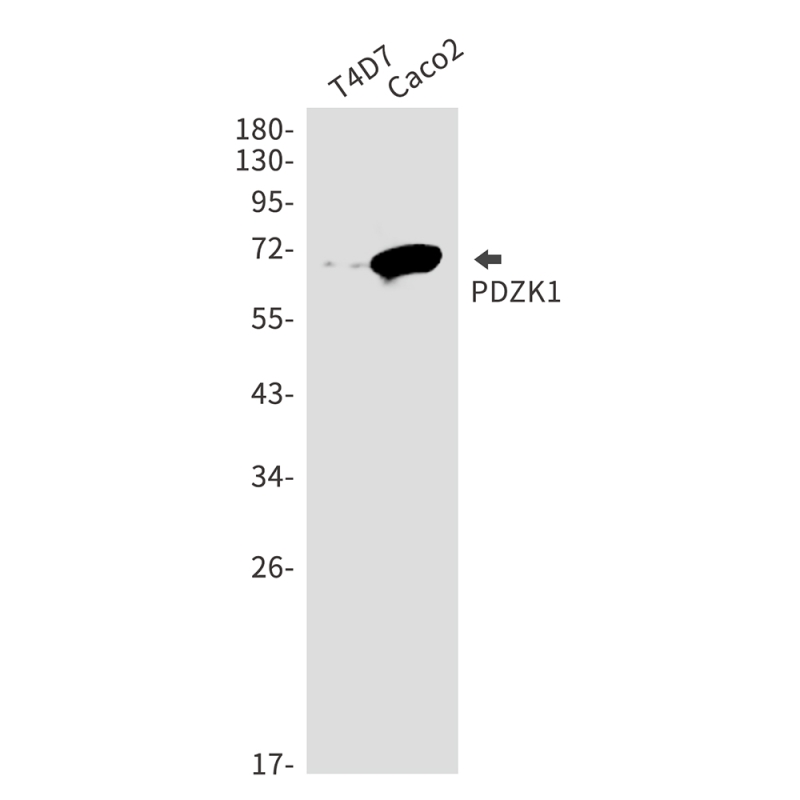
| WB | 1/500-1/1000 | Human,Mouse,Rat |
| IF | 1/20 | Human,Mouse,Rat |
| IHC | 咨询技术 | Human,Mouse,Rat |
| ICC | 技术咨询 | Human,Mouse,Rat |
| FCM | 咨询技术 | Human,Mouse,Rat |
| Elisa | 咨询技术 | Human,Mouse,Rat |
| Aliases | CAP70; CLAMP; PDZD1; NHERF3; NHERF-3 |
| Entrez GeneID | 5174 |
| WB Predicted band size | Calculated MW: 57 kDa; Observed MW: 70 kDa |
| Host/Isotype | Rabbit IgG |
| Antibody Type | Primary antibody |
| Storage | Store at 4°C short term. Aliquot and store at -20°C long term. Avoid freeze/thaw cycles. |
| Species Reactivity | Human |
| Immunogen | A synthetic peptide of human PDZK1 |
| Formulation | Purified antibody in TBS with 0.05% sodium azide,0.05%BSA and 50% glycerol. |
+ +
以下是关于PDZK1抗体的3篇参考文献的简要概括:
1. **文献名称**:*"PDZK1. a novel scaffold protein of the NHERF family, interacts with the PDGFRβ and regulates cell migration"*
**作者**:Kocher O. 等
**摘要**:该研究报道了PDZK1作为支架蛋白与血小板源性生长因子受体β(PDGFRβ)相互作用,调节细胞迁移和信号传导。通过PDZK1抗体的免疫共沉淀实验,证实其在细胞膜上与受体蛋白的物理结合,并揭示了其在细胞运动中的作用。
2. **文献名称**:*"Defective expression of PDZK1 disrupts proximal tubular reabsorption and causes nephrotic syndrome"*
**作者**:Hirao K. 等
**摘要**:文章利用PDZK1特异性抗体进行组织染色和Western blot分析,发现PDZK1在小鼠近端肾小管中高表达,其功能缺失导致关键转运蛋白(如NaPi-IIa)的膜定位异常,引发蛋白尿和肾病综合征样表型。
3. **文献名称**:*"PDZK1 regulates hepatic scavenger receptor class B type I (SR-BI) and plasma HDL cholesterol levels"*
**作者**:Kocher O. 等
**摘要**:研究通过PDZK1抗体的免疫荧光和免疫印迹实验,证明PDZK1与SR-BI受体结合,维持其在肝细胞膜上的稳定性,从而影响高密度脂蛋白(HDL)胆固醇的代谢。PDZK1基因敲除小鼠表现出HDL代谢紊乱。
(注:以上文献信息为示例性概括,具体文献需根据实际研究补充完整信息。)
The PDZK1 antibody is a crucial tool for studying the PDZ domain-containing protein PDZK1. a scaffolding protein involved in regulating membrane transport proteins and cellular signaling pathways. PDZK1. also known as Na+/H+ exchange regulatory cofactor 3 (NHERF3), interacts with PDZ-binding motifs of transporters, receptors, and channels, modulating their localization, stability, and function. It is particularly important in tissues like the kidney, liver, and intestine, where it regulates ion transport (e.g., SLC9A3R1/NHE3) and lipid metabolism. Dysregulation of PDZK1 has been linked to diseases such as hypertension, metabolic disorders, and cancers, including colorectal and breast cancer.
PDZK1 antibodies are widely used in research to detect protein expression and distribution via techniques like Western blotting, immunohistochemistry (IHC), and immunofluorescence (IF). These antibodies are typically raised against specific epitopes, such as the C-terminal region of human PDZK1. and validated for cross-reactivity in common model organisms (e.g., mouse, rat). Commercial antibodies often undergo quality controls, including knockout cell line validation, to ensure specificity. Researchers rely on PDZK1 antibodies to explore its role in cellular pathways, disease mechanisms, and potential therapeutic targets. Proper validation and application-specific optimization are essential to avoid non-specific binding, given structural similarities among PDZ domain proteins.
×